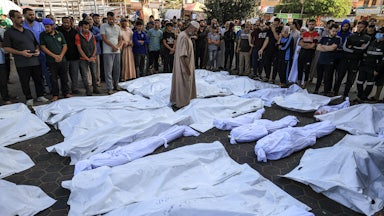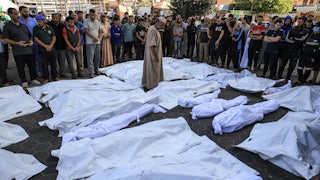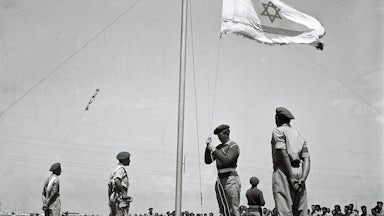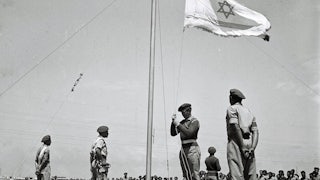In the dusk and dust of Gaza’s ruin, the Israeli soldiers danced. “I’m coming to occupy Gaza / and beat Hezbollah,” they chanted, “I stick by one mitzvah / to wipe off the seed of Amalek.” It was December 7, two months after Hamas’s attack on Israeli civilians. The troops formed a circle and continued their song: “I left home behind me / won’t come back until victory. / We know our slogan / there are no uninvolved civilians.” The first refrain of their charming tune called back to Prime Minister Benjamin Netanyahu’s evocation of the ur-enemy of the Jews; the final repeated line paraphrased their own head of state: “It is an entire nation out there that is responsible,” Israeli President Isaac Herzog told the press in mid-October. “It is not true this rhetoric about civilians not being aware, not involved.”
Between an innocent Palestinian and a guilty one, Herzog saw no difference. Yoav Gallant, the defense minister, didn’t either. When he ordered a siege of Gaza so total that “no electricity, no food, [and] no fuel” be allowed to enter, he decided that both guerilla and child alike should not survive the blockade. Israel Katz, now the foreign minister, likewise insisted that the “civilian population … will not receive a drop of water or a single battery until they leave the world.” Palestinians cannot leave Gaza, so Katz presumably meant they would get nothing until they reached heaven, perhaps hell—either way, until they were dead. The dancing soldiers understood very clearly what was instructed of them. They followed a sacred commandment, and joined in the vengeful chorus, whose echoes can now be heard in the courtrooms of The Hague.
At the Peace Palace on Friday, the judges of the International Court of Justice took special care to quote these statements by Herzog, Gallant, and Katz. The men’s words, incriminating themselves, as well as the state they serve, as genocidaires, formed the backbone of the judges’ ruling—a provisional, interim ruling—that there is a significant, plausible, prima facie threat of Gaza’s Palestinians being destroyed “in whole or in part.” The Israeli government and its army must, the court ordered, “take all measures within its power to prevent the commission of [genocidal] acts.” It must also “prevent and punish the direct and public incitement to commit genocide,” an order that means that Netanyahu’s government, if it cares at all about living up to the standards of international law it constantly trumpets, must immediately indict its own ministers and its own president.
South Africa, which brought the case before the ICJ, asked for nine provisional measures; the court issued six, insisting that they “need not be identical to those requested.” Still, the ruling rejected almost every objection—moral, technical, procedural—thrown up by the Israeli team in their messy appearance at the hearing earlier this month. The court ruled that under the Genocide Convention, which binds all signatories to “prevent and punish” the crime, South Africa had solid grounding to bring a case; it also ruled that it had jurisdiction to issue measures and hear the full case later on. Importantly, and contrary to the Israeli defense team’s best efforts, it recognized the right of Palestinians not to be subject to annihilation. In essence, Israel was read its Miranda rights: Any genocides you commit now can and will be later used against you in court. And there will be a later. A “preliminary objections” phase may follow down the line, in which the Israelis can challenge the court’s competence. For now, put bluntly, Israel is on trial for genocide.
To speak of “victory” for one side and “defeat” of the other, however, would be naïve and premature. The judges blankly refused to even mention South Africa’s principal request: an immediate cessation of all military operations in Gaza. As morally outrageous as this refusal might seem, the judges were legally correct, and followed the one coherent and sound objection made from the Israeli side. Any order rendering military action illegal would be binding on Israel but not Hamas, leaving the state unable to defend itself against attack; such a ruling would be prejudicial against a state’s right to self-defense. And although South Africa asked for fact-finding teams to be allowed to enter Gaza, the court requested only that Israel draw up a report on its compliance with the ICJ’s order and refrain from destroying evidence.
Undeniably humiliating for Israel, however, were the voting margins. All of the court’s measures were accepted by a margin of 15–2 or 16–1. One judge—Julia Sebutinde of Uganda—voted against every measure on the grounds that the ICJ had no jurisdiction to hear the case, thus making her objection rather moot. Not even Aharon Barak, the former Israeli Supreme Court president appointed to the panel, went that far. Barak voted in favor of two of the court’s measures: the order demanding punishment for incitement and the request for “immediate and effective measures to enable the provision of urgently needed basic services.” Three months ago, Barak said he agreed “totally with what the [Israeli] government is doing,” but perhaps he has since foreseen that his own legacy as a defender of his country’s constitutional system is worth more than protecting Netanyahu before the judgment of the world.
On October 12, when Isaac Herzog gave his opinion that there was no difference between a Palestinian militant and a pregnant Palestinian woman, he was standing next to Ursula von der Leyen, head of the European Commission. As Herzog spoke, von der Leyen blinked and said nothing. She heard it said, not a few inches from her own face, that an “entire nation” was guilty and deserving of death, and raised no objection. Western diplomats and politicians have done a lot of that recently: blinking and saying nothing, stirring only when the purse strings jingle and the Israelis ask for more ammunition. This is not a facetious observation: Most nations, including the United States, have strict rules against selling arms to nations that violate international law. Though such a rule has not stopped gun-runners before, part of the worth of the ICJ’s order is in having one more weapon that might be used to run a stick through the spokes of the machine, something that might, with a little effort, slow the tally of Palestinian dead from steadily ticking upward.
In delivering its statement just two weeks after hearing first submissions, the court was clearly sensitive to the urgency of the Palestinian plight. Indeed, part of the task before the judges was to find whether South Africa’s application was sufficiently urgent that a ruling couldn’t wait until later. (They found that it was.) For those Gazans still alive but on the edge of starvation, for those Palestinians sleeping now in the open and with no medical care at all, let alone power or potable water, the court’s speed matters. The Israeli government has now been told that it must give them aid and prevent their slow slide into oblivion. But what of the dead? What of the homes—360,000 of them, according to the ICJ—the Israel Defense Forces have shelled, bombed, and dynamited, to which no Palestinian can ever return?
The Israeli government insists its evacuation measures are only temporary. So was the Nakba. Perhaps as many as half of all Gazans have so far been permanently displaced. Permanence matters, because if the Israeli government chooses to ignore the court’s ruling and carries on its present course, then by the time the next stage of hearings begins, the court will be asked to judge something that has already happened and has passed, with all its pain, into history. Even now, when a people might still be salvaged, permanent “solutions” are being suggested. Earlier this week, in a meeting with European diplomats, Israel Katz pitched building an artificial island off the Gazan coast. Clothing what he said in the benign language of “development,” Katz didn’t stop to ask whether it was his land (or sea) to build on, whether he had any right to it. This is what thinking looks like in the upper ranks of the Netanyahu war Cabinet. Permanence is its goal, and no Palestinian—alive or dead—is allowed to object.






